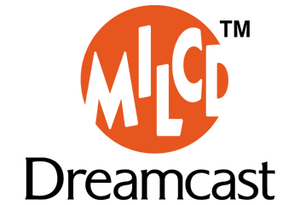Difference between revisions of "Mil-CD"
From Sega Retro
m |
|||
| (5 intermediate revisions by 3 users not shown) | |||
| Line 1: | Line 1: | ||
| − | {{sub-stub}} | + | [[File:milcd_logo.png|right|300px]] |
| − | '''Mil-CD''' was a compact disc storage format created by [[Sega]] in 1998 to add multimedia features to normal CDs for use on the [[Sega Dreamcast]] | + | {{sub-stub}}'''Mil-CD''' ('''M'''usic '''I'''nteractive '''L'''ive'''-CD''', 見るCD) was a compact disc storage format created by [[Sega]] in 1998 to add multimedia features to normal CDs for use on the [[Sega Dreamcast]]. |
| − | + | Mil-CD was envisoned as an enhanced format for music, but with no major record labels willing to back the format, only eight Mil-CD albums were released, all of which were exclusive to Japan. However, the Mil-CD technology became (in)famous for other reasons, as its lack of security allowed the format to be exploited, paving the way for unlicensed software to boot on the Dreamcast console, and by extension, opening a market for software piracy. | |
| − | |||
| − | |||
| − | |||
| − | |||
| − | |||
| − | {{ | + | While burning entire games en masse to [[GD-ROM]]s was (and still is) unfeasible for unlicensed Dreamcast developers, Dreamcasts supporting Mil-CD discs can boot code from commonly found CD-Rs. Often by compressing (or removing) audio tracks from the game, a typical Dreamcast game can be stored on a CD-R with relative ease. |
| + | |||
| + | To combat piracy, while acknowledging the failure of the Mil-CD format, Sega removed Mil-CD support from later Dreamcast models. Mil-CD support is not immediately obvious, however systems manufactured after November 2000 (distinguishable both by the barcode and the use of "Sega Corporation" as a company name (which coincidentally became official on November 1st) generally lack Mil-CD support. | ||
| + | |||
| + | ==Discs== | ||
| + | {{#dpl: | ||
| + | |categorymatch=Mil-CD | ||
| + | |namespace= | ||
| + | |include={ReleasesMusic}:cd_date_jp | ||
| + | |order= | ||
| + | |ordermethod= | ||
| + | |mode=userformat | ||
| + | |secseparators=\n* ''[[%PAGE%]]'' (²{year¦,}²) | ||
| + | }} | ||
| + | |||
| + | ==Magazine articles== | ||
| + | {{mainArticle|{{PAGENAME}}/Magazine articles}} | ||
| + | |||
| + | ==External links== | ||
| + | *[http://web.archive.org/web/20010314190533/http://www.sega.co.jp/milcd/home.html About Mil-CD (Sega)] (Japanese Archive) | ||
| + | *[http://www.dricas.com/special/milcd/index.html About Mil-CD (Dricas)] (Japanese) | ||
| + | *[http://www.dcemu.co.uk/vbulletin/threads/26670-History-of-Dreamcast-Hombrew-%28retrorevival-co-uk%29 Dreamcast Hack] | ||
| + | |||
| + | ==References== | ||
| + | <references /> | ||
| + | |||
| + | [[Category:Mil-CD]] | ||
[[Category:Dreamcast hardware]] | [[Category:Dreamcast hardware]] | ||
Latest revision as of 03:07, 1 November 2024
This teeny-tiny article needs some work. You can help us by expanding it.
Mil-CD (Music Interactive Live-CD, 見るCD) was a compact disc storage format created by Sega in 1998 to add multimedia features to normal CDs for use on the Sega Dreamcast.
Mil-CD was envisoned as an enhanced format for music, but with no major record labels willing to back the format, only eight Mil-CD albums were released, all of which were exclusive to Japan. However, the Mil-CD technology became (in)famous for other reasons, as its lack of security allowed the format to be exploited, paving the way for unlicensed software to boot on the Dreamcast console, and by extension, opening a market for software piracy.
While burning entire games en masse to GD-ROMs was (and still is) unfeasible for unlicensed Dreamcast developers, Dreamcasts supporting Mil-CD discs can boot code from commonly found CD-Rs. Often by compressing (or removing) audio tracks from the game, a typical Dreamcast game can be stored on a CD-R with relative ease.
To combat piracy, while acknowledging the failure of the Mil-CD format, Sega removed Mil-CD support from later Dreamcast models. Mil-CD support is not immediately obvious, however systems manufactured after November 2000 (distinguishable both by the barcode and the use of "Sega Corporation" as a company name (which coincidentally became official on November 1st) generally lack Mil-CD support.
Discs
- Nine Chairs (1999)
- Kita e. White Illumination Pure Song and Pictures (1999)
- Heartbreak Diary (1999)
- Checkicco no Miru CD (1999)
- Hang the DJ (1999)
- Himitsu Original Sound Track (1999)
- D2 Original Sound Track (1999)
- Space Channel 5 Ulala The Movie (1999)
Magazine articles
- Main article: Mil-CD/Magazine articles.
External links
- About Mil-CD (Sega) (Japanese Archive)
- About Mil-CD (Dricas) (Japanese)
- Dreamcast Hack
